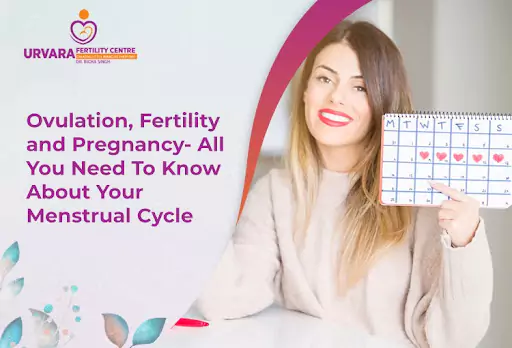Ovulation, Fertility, and Pregnancy - Menstrual Cycle
Knowing your menstrual cycle increases your chances of becoming pregnant. The first phase begins on the first day of your period when you start bleeding. Hormones like follicle-stimulating hormone (FSH) are released by your body and cause the eggs inside your ovaries to develop. Those hormones also help thicken the lining of your uterus between days 2 and 14, preparing it for a fertilised egg. The follicular stage is the name for this stage
The menstrual cycle lasts 28-35 days on average. Ovulation occurs between days 11 and 21 of your menstrual cycle. The hormone luteinizing hormone (LH) spikes, signaling the release of the most mature egg. At the same time, the mucus in your cervical cavity becomes more slippery, making it easier for sperm to reach the egg.
Women are born with approximately 1 million to 2 million eggs, but only 300 to 400 are released during their lifespan through ovulation. Normally, you only release one every month. One of the two fallopian tubes that connect your ovaries to your uterus is where the egg travels. Sperm may fertilize it on its route to the uterus if the timing is correct. The egg dissolves if fertilization does not occur within 24 hours of the egg leaving the ovary. Knowing when you're ovulating can help you and your partner plan sex for when you're most likely to conceive. Sperm can live for 3 to 5 days, so knowing when you're ovulating can help you and your spouse schedule sex for when you're most likely to conceive. When intercourse occurs 1-2 days before ovulation, you have the best chance of becoming pregnant. Count back 14 days from when you expect your next period to begin if you have a 28-day cycle. Around that time, plan on having sex every other day — say, days 12 and 14. It's important to remember that having sex every day can reduce a man's sperm count. Because your cycle may be longer or shorter than usual, an online ovulation calculator can assist you in determining the most likely day.
The hormone progesterone is released when an egg is released, and it helps to grow and maintain the uterine lining. It causes a small increase in body temperature. Using a basal thermometer to take your temperature every morning before getting out of bed will help you figure out if you've ovulated. These thermometers are available at your local pharmacy. They're cheap, but they're not as accurate as other ovulation tracking methods.
Your ovaries are triggered to release an egg when your LH levels rise. The surge typically occurs 36 hours before the egg's discharge. Ovulation kits measure LH levels in your urine to assist you figure out when you're due to ovulate. These kits, which can be purchased at a pharmacy, are both convenient and accurate. It's a good idea to test 1-2 days before the expected spike so you can track the increase in LH.
The hormone progesterone kicks in during the second half of your menstrual cycle to help prepare the lining of your uterus for a fertilized egg. If the egg isn't fertilized and doesn't implant, it disintegrates, progesterone levels drop, and the egg, along with blood and tissues from the uterus lining, is expelled from the body 12 to 16 days later. Menstruation is the name for this process. It normally lasts between three and seven days.
Losing weight can increase your chances of becoming pregnant if you're overweight or obese. According to a study, women with a BMI higher than normal took twice as long to conceive as women with a normal BMI. However, a 5- to 10-pound weight loss can significantly enhance ovulation and pregnancy rates. In men, obesity can lead to infertility and low testosterone levels. Infertility can also be caused by being very underweight.
Fertility declines with age, particularly beyond the mid-thirties. It also reduces the likelihood of effective fertility treatments. If you're under 35 and have been trying to conceive for more than 12 months, or if you're over 35 and have been trying for more than 6 months, experts recommend speaking with your doctor.
Dr. Richa is an infertility specialist who has assisted Thousands of infertile couples in India and throughout the world for their conception and majority of them have benefited from her services. She has received multiple awards for her services to infertility research and women's health. She has successfully delivered several healthy infants, thanks to her extensive experience and tried-and-true method.. She is a member of several honorary organizations and has received numerous awards. Urvara Fertility Center in Lucknow is without a doubt the greatest IVF center in the city, thanks to Dr. Richa's competence
